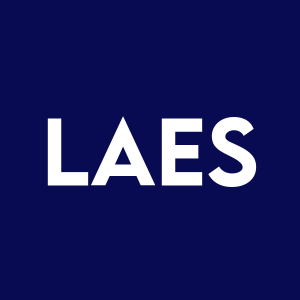SEALSQ Introduces QS7001, a Newly Developed Cutting-Edge RISC-V Secure Hardware Platform, Specifically Designed for IoT security in the Post-Quantum Era
Rhea-AI Summary
SEALSQ Corp (NASDAQ: LAES) has introduced the QS7001, a cutting-edge RISC-V secure hardware platform designed for IoT security in the post-quantum era. This groundbreaking platform incorporates NIST's recommended quantum-resistant algorithms, Kyber and Dilithium, to protect against quantum-enabled breaches. The QS7001 is certified to Common Criteria EAL5+ and compliant with FIPS SP800-90B, meeting high standards of reliability and security.
As quantum computing threatens traditional encryption methods, SEALSQ's innovation positions the company at the forefront of the transition to post-quantum security solutions. The platform aims to safeguard critical data and infrastructure across sectors such as healthcare, finance, and critical infrastructure, providing defense against 'harvest now, decrypt later' threats.
Positive
- Introduction of QS7001, a new post-quantum chip for IoT security
- Incorporation of NIST-recommended quantum-resistant algorithms Kyber and Dilithium
- Certification to Common Criteria EAL5+ and compliance with FIPS SP800-90B standards
- Positioning SEALSQ as a leader in post-quantum security solutions
Negative
- None.
News Market Reaction – LAES
On the day this news was published, LAES gained 24.71%, reflecting a significant positive market reaction.
Data tracked by StockTitan Argus on the day of publication.
Geneva, Switzerland, Aug. 19, 2024 (GLOBE NEWSWIRE) -- SEALSQ Corp (NASDAQ: LAES) ("SEALSQ" or "Company"), a company that focuses on developing and selling Semiconductors, PKI and Post-Quantum technology hardware and software products, is pioneering the shift to quantum-resistant cybersecurity with its newly developed post-quantum chip, QS7001. As the digital age progresses, the need for robust, quantum-resilient security becomes more pressing than ever. SEALSQ’s groundbreaking platform represents a vital advancement in securing critical data and infrastructure against the imminent threats posed by quantum computing.
SEALSQ’s QS7001: A Game-Changer in Post-Quantum Cybersecurity
In response to the growing quantum threat, SEALSQ has introduced the QS7001, a cutting-edge RISC-V secure hardware platform specifically designed for IoT security in the post-quantum era. The platform incorporates NIST’s recommended quantum-resistant algorithms, Kyber and Dilithium, to ensure robust protection against quantum-enabled breaches. This innovation positions SEALSQ at the forefront of the transition to post-quantum security solutions.
“The QS7001 represents a transformative leap in cybersecurity,” said Jean Pierre Enguent, CTO at SEALSQ. “As quantum computing capabilities advance, the vulnerabilities of current encryption methods become increasingly apparent. With our QS7001, we are set to provide industries and governments with the tools they need to safeguard their data and devices against the looming quantum threat.”
Additional details can be found at https://www.sealsq.com/semiconductors/post-quantum-risc-v-chips
The Quantum Computing Threat and Its Impact on Cybersecurity
Quantum computing is set to revolutionize multiple industries, but it also poses significant risks to current encryption methods. Traditional cryptographic algorithms like RSA and ECC, which have been the bedrock of secure communications, are increasingly vulnerable to attacks by quantum-enabled adversaries. The immense processing power of quantum computers, which can solve complex mathematical problems exponentially faster than classical computers, threatens to render existing cryptography obsolete.
The urgency of addressing this threat was underscored by the recent release of three quantum-resistant encryption algorithms by the U.S. National Institute of Standards and Technology (NIST). These algorithms, developed through NIST’s rigorous post-quantum cryptography standardization process, are a critical step toward securing sensitive data from future quantum attacks.
For more information visit: https://www.sealsq.com/about/research-innovation/quantum-proof-cryptography
Post-Quantum Cryptography: A Necessary Evolution
The advent of quantum computing requires a proactive approach to secure today’s and tomorrow’s information. Post-quantum cryptography (PQC) is not merely an enhancement of existing methods but a complete rethinking of how data security is approached in a world where quantum attacks are no longer theoretical but imminent. NIST’s newly introduced standards, encapsulated in FIPS 203, 204, and 205, offer a framework for general encryption and digital signatures that are resistant to quantum computing capabilities.
SEALSQ’s QS7001 platform is certified to the Common Criteria EAL5+ and compliant with FIPS SP800-90B, ensuring it meets the highest standards of reliability and security. The QS7001 is engineered to protect IoT devices across sectors such as healthcare, finance, and critical infrastructure, providing a robust line of defense against “harvest now, decrypt later” threats—where adversaries gather encrypted data today, intending to decrypt it once quantum technology matures.
Securing the Future: SEALSQ’s Vision for a Quantum-Resistant World
SEALSQ’s commitment to leading the post-quantum transition is evident not just in the QS7001 platform but in the company’s broader strategy. By aligning with NIST’s guidelines and industry standards, SEALSQ is setting a new benchmark for secure IoT solutions in a rapidly evolving cybersecurity landscape.
“As we stand on the brink of the quantum era, it’s essential that we prepare for the security challenges it will bring,” added Bernard VIAN, Managing Director, “SEALSQ is dedicated to ensuring that our customers and partners are equipped with the technology needed to stay ahead of these emerging threats. The QS7001 is just the beginning of our journey toward building a resilient, quantum-secure digital future.” https://www.ineltek.co.uk/post/ensuring-iot-security-post-quantum-sealsq-solutions
About SEALSQ
SEALSQ focuses on selling integrated solutions based on Semiconductors, PKI and Provisioning services, while developing Post-Quantum technology hardware and software products. Our solutions can be used in a variety of applications, from Multi-Factor Authentication tokens, Smart Energy, Smart Home Appliances, Medical and Healthcare and IT Network Infrastructure, to Automotive, Industrial Automation and Control Systems.
Post-Quantum Cryptography (PQC) refers to cryptographic methods that are secure against an attack by a quantum computer. As quantum computers become more powerful, they may be able to break many of the cryptographic methods that are currently used to protect sensitive information, such as RSA and Elliptic Curve Cryptography (ECC). PQC aims to develop new cryptographic methods that are secure against quantum attacks. For more information, please visit www.sealsq.com.
Forward-Looking Statements
This communication expressly or implicitly contains certain forward-looking statements concerning SEALSQ Corp and its businesses. Forward-looking statements include statements regarding our business strategy, financial performance, results of operations, market data, events or developments that we expect or anticipates will occur in the future, as well as any other statements which are not historical facts. Although we believe that the expectations reflected in such forward-looking statements are reasonable, no assurance can be given that such expectations will prove to have been correct. These statements involve known and unknown risks and are based upon a number of assumptions and estimates which are inherently subject to significant uncertainties and contingencies, many of which are beyond our control. Actual results may differ materially from those expressed or implied by such forward-looking statements. Important factors that, in our view, could cause actual results to differ materially from those discussed in the forward-looking statements include the expected success of our technology strategy and solutions for IoMT Security for Medical and Healthcare sectors, SEALSQ's ability to implement its growth strategies, SEALSQ's ability to continue beneficial transactions with material parties, including a limited number of significant customers; market demand and semiconductor industry conditions; and the risks discussed in SEALSQ's filings with the SEC. Risks and uncertainties are further described in reports filed by SEALSQ with the SEC.
SEALSQ Corp is providing this communication as of this date and does not undertake to update any forward-looking statements contained herein as a result of new information, future events or otherwise.
Press and Investor Contacts
| SEALSQ Corp. Carlos Moreira Chairman & CEO Tel: +41 22 594 3000 info@sealsq.com | SEALSQ Investor Relations (US) The Equity Group Inc. Lena Cati Tel: +1 212 836-9611 / lcati@equityny.com Katie Murphy Tel: +212 836-9612 / kmurphy@equityny.com |







